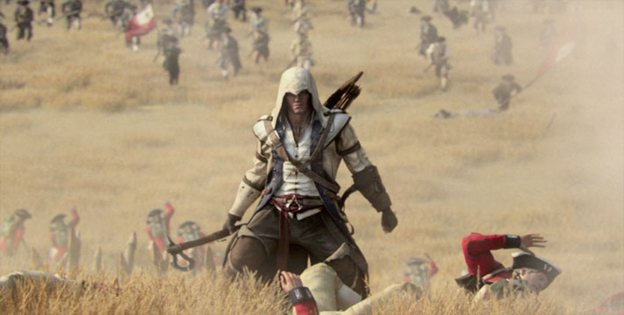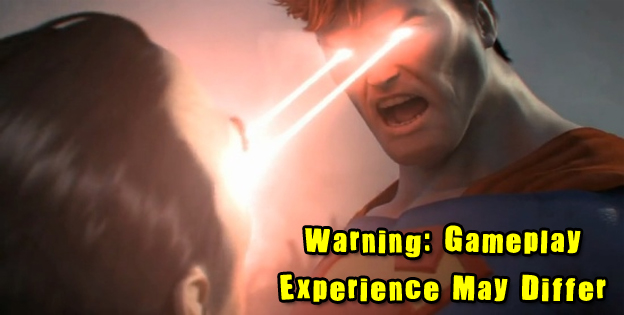There's a place for cinematic trailers. Blizzard's cinematic openings for its games are so popular that the company has started using them as part of a game's pre-release promotion. It's well-understood that these pieces are pure movie magic, though, and they're always released alongside plenty of trailers showing what the game actually looks like. Similarly, companies will sometimes make cinematic trailers for a game that's already been released in order to draw more attention to the product. In this case, it's easy for a potential consumer to look up gameplay on Youtube or read reviews, so there's no excuse for being disappointed by the promises of the trailer.
When out-of-engine trailers become a problem is when they're the focal point for a game's promotional campaign. If a game is showing very little but cinematic or live-action pieces before it's released, that's like putting a huge "Buyer Beware" sign up for consumers. Why won't the game's marketing team show the actual game? Is it ugly? Boring? Or is the marketing team simply completely disconnected from the development team due to corporate bureaucracy?
Two
examples of recent games that overused cinematic trailers during
promotion are Dead Island and Star Wars: The Old Republic. The zombie
action-RPG Dead Island made a huge splash when it released a dark,
deeply-affecting trailer showing people on an island resort being
affected by the beginning of a zombie apocalypse. The trailer greatly
excited a lot of gamers, who were quickly disappointed when the actual
game had very little emotional resonance. Far from being a dark
meditation on the survival genre, Dead Island was mostly a game in which
the player carved up zombies in gruesome ways while poorly-written
characters spouted wisecracks.
Star Wars: The Old Republic's marketing campaign placed a heavy focus on cinematic trailers, and any that showed actual gameplay were heavily cut, giving the impression that gameplay (and combat in particular) was far more dynamic than it actually was. These trailers did an excellent job capturing the imagination of Star Wars fans, but they also built up anticipation beyond the level that the actual gameplay could sustain. The truth is that Star Wars: The Old Republic has a very conventional hotbar-based MMORPG combat system that was not nearly as exciting or dynamic as the action shown in the cinematic trailers.
 Plenty of people enjoyed playing both Dead Island and Star Wars: The
Old Republic: neither game was bad, per se. However, the marketing
campaigns for both games led to disappointment on the part of many
consumers, when the game turned out to look and play quite differently
from how it was portrayed in trailers. These types of marketing
campaigns can certainly work against a company in the long run. It's
interesting to see that Deep Silver has released a similarly emotional
and cinematic trailer for Dead Island's sequel, one that gamers are
viewing with a deeply cynical eye due to the issues with the first game.
Plenty of people enjoyed playing both Dead Island and Star Wars: The
Old Republic: neither game was bad, per se. However, the marketing
campaigns for both games led to disappointment on the part of many
consumers, when the game turned out to look and play quite differently
from how it was portrayed in trailers. These types of marketing
campaigns can certainly work against a company in the long run. It's
interesting to see that Deep Silver has released a similarly emotional
and cinematic trailer for Dead Island's sequel, one that gamers are
viewing with a deeply cynical eye due to the issues with the first game.
As for Star Wars: TOR, the game lost many of its initial subscribers and wasn't able to maintain the kind of subscription base it was expected to maintain. It's hard to tell how many lost subscriptions were due to players being disappointed that the game wasn't enough like its trailers, but that was likely a factor in some gamer disappointment.
 Cinematic trailers can be fun, but gamers need to be more discerning
when it comes to making purchase decisions based on trailers that don't
show actual gameplay. With the high price of most modern games, we
should demand a look at the actual game engine and search for gameplay
demonstrations before plunking down our money sight unseen. Likewise,
while games need a strong advertising campaign in order to garner strong
sales, companies should be careful not to over-promise what a game can
do with cinematic trailers, lest gamers feel burned and abandon a game
series. After all, shouldn't games look great and be fun to play without
needing an extra coat of CGI makeup covering them up?
Cinematic trailers can be fun, but gamers need to be more discerning
when it comes to making purchase decisions based on trailers that don't
show actual gameplay. With the high price of most modern games, we
should demand a look at the actual game engine and search for gameplay
demonstrations before plunking down our money sight unseen. Likewise,
while games need a strong advertising campaign in order to garner strong
sales, companies should be careful not to over-promise what a game can
do with cinematic trailers, lest gamers feel burned and abandon a game
series. After all, shouldn't games look great and be fun to play without
needing an extra coat of CGI makeup covering them up?
http://www.cheatcc.com
Star Wars: The Old Republic's marketing campaign placed a heavy focus on cinematic trailers, and any that showed actual gameplay were heavily cut, giving the impression that gameplay (and combat in particular) was far more dynamic than it actually was. These trailers did an excellent job capturing the imagination of Star Wars fans, but they also built up anticipation beyond the level that the actual gameplay could sustain. The truth is that Star Wars: The Old Republic has a very conventional hotbar-based MMORPG combat system that was not nearly as exciting or dynamic as the action shown in the cinematic trailers.

As for Star Wars: TOR, the game lost many of its initial subscribers and wasn't able to maintain the kind of subscription base it was expected to maintain. It's hard to tell how many lost subscriptions were due to players being disappointed that the game wasn't enough like its trailers, but that was likely a factor in some gamer disappointment.

http://www.cheatcc.com

No comments:
Post a Comment